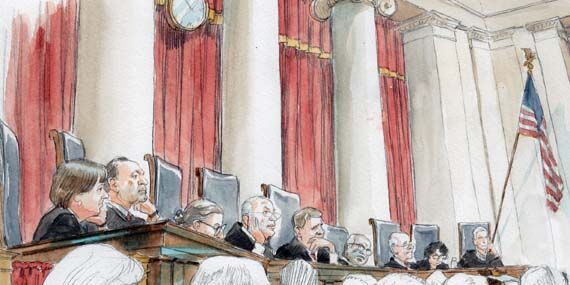Thursday round-up

Yesterday the Supreme Court issued its first full opinion of the October 2017 term, in Hamer v. Neighborhood Housing Services of Chicago, holding that a time limit in a court-made rule is not jurisdictional. Howard Wasserman analyzes the argument for this blog. Subscript offers a graphic explainer for the decision.
At Balkinization, Marty Lederman takes a close look at last week’s cert petition in Hargan v. Garza, in which the solicitor general asked the justices to vacate a lower-court decision in favor of a pregnant undocumented teen who was attempting to obtain an abortion and to discipline the teen’s attorneys, concluding that “there are serious questions whether the brief meets the high standards that OSG and DOJ have long insisted upon and that the Court has come to expect from the federal government.” In an op-ed for The New York Times, Linda Greenhouse argues that in its “breathtakingly audacious” petition, “the government itself [is] claiming a right not to follow the law.”
At Slate, David Gans explains why, although all eyes have been on Justice Anthony Kennedy as the potential swing vote in Masterpiece Cakeshop v. Colorado Civil Rights Commission, in which the court will decide whether the First Amendment bars Colorado from requiring a baker to create a cake for a same-sex wedding, “Chief Justice John Roberts might ultimately himself prove to be just as important.” At In a Crowded Theater, Erica Goldberg “cover[s] the difficulty of articulating a viable legal rule in Masterpiece Cakeshop.”
Briefly:
- At National Review, Ed Whelan, the co-editor of “Scalia Speaks,” a new compilation of the late justice’s speeches, highlights some of the book’s “wonderful reviews,” for which “[a]ll credit goes to Justice Scalia.”
- At Sports Handle, Brett Smiley interviews New Jersey State Senator Raymond Lesniak, “a champion for New Jersey’s fight for sports betting since the fight began almost a decade ago,” about Christie v. National Collegiate Athletic Association, a constitutional challenge to the federal ban on sports betting, asking Lesniak “to reflect on the early days of the battle, where things stand now, and where different results in the high court might lead.”
- At Supreme Court Brief (subscription required), Tony Mauro reports that “[t]he libertarian Cato Institute, known for its irreverent, sometimes funny, U.S. Supreme Court briefs, has just aimed its provocative writing at prairie dogs,” urging the court to review a commerce-clause challenge to federal regulations protecting the Utah prairie dog under the Endangered Species Act; Utah prairie dogs, the brief contends, “‘produce nothing of importance except the annoyance of the surrounding population—and they make terrible pets.'”
- Fix the Court announces the receipt “[a]fter months of delays” of 2016 financial-disclosure reports for several federal judges, including Justice Neil Gorsuch.
- For the Milwaukee Journal Sentinel, Bruce Vielmetti reports that the “[o]wners of a family legacy cabin on Lake St. Croix got what they wanted Tuesday from the Wisconsin Legislature, months after they were denied by the U.S. Supreme Court” in Murr v. Wisconsin, in which the court last term upheld a lower-court decision rejecting the family’s regulatory-takings claim.
- At Florida Court Review, John Cavaliere notes that the Supreme Court last night declined to halt the execution of Florida death-row inmate Patrick Hannon, and that “[f]or now, the Florida Supreme Court’s Hurst-implementation program appears to have tacit approval by the federal courts, including SCOTUS.”
We rely on our readers to send us links for our round-up. If you have or know of a recent (published in the last two or three days) article, post, podcast, or op-ed relating to the Supreme Court that you’d like us to consider for inclusion in the round-up, please send it to roundup [at] scotusblog.com. Thank you!
Posted in Round-up
